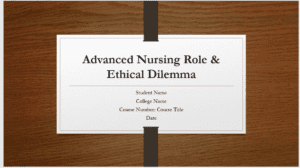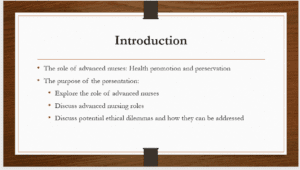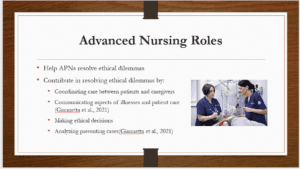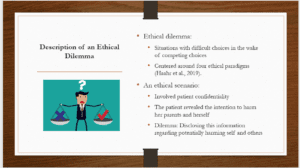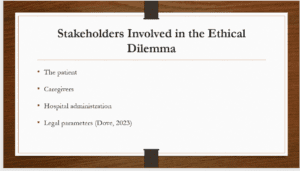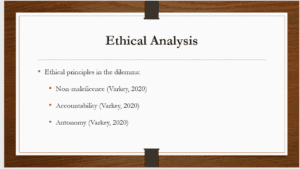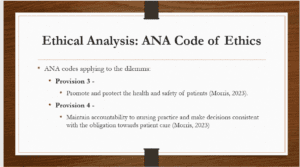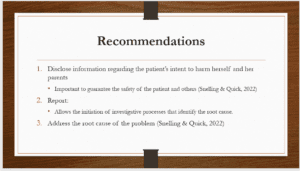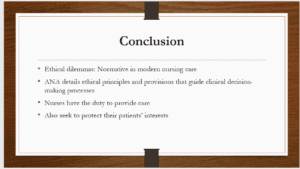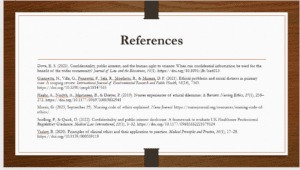Advanced Nursing Role & Ethical Dilemma
Hello, and welcome to this kickoff presentation. We will discuss advanced nursing roles and potential ethical dilemmas.
The modern healthcare landscape is marred with varying clinical complexities. In the resolve to better community health by promoting health and wellness, addressing complex clinical scenarios is normative. Advanced nurses play a role in health preservation and promotion. Their expertise and skills place them in a better position to manage clinical complexities. As nurse leaders, they not only guide other nurses in direct patient care but also collaborate with other caregivers in ethical decision-making. In this presentation, we explore the roles of advanced nurses and how these roles enable them to perpetuate optimal care. We will also discuss potential ethical dilemmas for advanced nurses in their clinical decision-making roles and how these dilemmas can be addressed.
Advanced Practice Nurses (APNs) play a pivotal role in contemporary healthcare. Their skills and expertise enable them to provide primary care in diverse clinical settings. APNs can contribute to the resolution of ethical dilemmas by coordinating care between patients, their families, and caregivers. Giannetta et al. (2021) note that APNs, as nurse leaders, preserve the duty to communicate aspects of illnesses and patient care to patients and their families and care professionals, thus enhancing patients’ understanding of their presentations. APNs can also contribute to the resolution of ethical dilemmas by making ethical decisions (Giannetta et al., 2021). APNs are nurse leaders involved in critical decision-making processes. Ethical decision-making can help address some ethical dilemmas. APNs can also contribute to the resolution by using their clinical expertise and knowledge to analyze the presenting case (Giannetta et al., 2021). Subsequently, this may help them make an informed and ethical decision.
Ethical dilemmas are normative in modern nursing care. They represent situations where nurses and other caregivers face difficult choices in the wake of unclear answers or choices (Haahr et al., 2019) . In this respect, caregivers have to choose between two or more morally accepted choices or an option among equally unaccepted courses of action. Ethical dilemmas in healthcare are often centered around the ethical paradigms of truth versus loyalty, justice versus mercy, individual versus community, and short-term versus long-term (Haahr et al., 2019). An ethical dilemma I have encountered during my practice bordered on patient confidentiality. The patient, in this case, confided in me her plan to harm her parents for what she termed as a lack of parental compassion and later kill herself. The dilemma was whether to disclose this information or not. It was later established that the client had severe depression and was managed appropriately.
In the ethical dilemma presented, the stakeholders involved include the patient, caregivers, hospital administration, and the legal parameters involved if the client settles on a lawsuit. The patient is drawn into the dilemma as she was directly involved. Her intentions, if left unchecked, may result in profound harm to herself and her parents. She may file a lawsuit for confidentiality breach as per the legal statutes on patient confidentiality and privacy (Dove, 2023). Caregivers are also involved. Their decision, in this respect, may have an implication for the patient, the patient’s family, and themselves. The hospital administration and legal parameters may be involved if the patient opts to interrogate the case on legal lines. In this regard, they will form part of the defence team and argue the overarching intention of the caregivers to disclose confidential information.
The ethical principles that interplay in the dilemma presented include non-maleficence, accountability, and autonomy. Non-maleficence requires caregivers to do no harm to their patients. In this respect, their decisions should protect their patients from harm’s way and not deprive them of better health (Varkey, 2020). Caregivers, in this case, had the obligation to protect the patient from harm. The principle of accountability grants caregivers a greater responsibility to comply with other principles and with the standards of nursing professional practice (Varkey, 2020). In this respect, they are implored to guarantee patient confidentiality and also act in their best interest. However, in the case presented, accountability required that patient confidentiality be breached to protect the patient and her family. Autonomy gives patients the right to make important decisions about their health. Per this principle, caregivers are expected to respect their patients’ choices, maintain confidentiality, and seek informed consent before initiating therapy (Varkey, 2020). Contravening this principle was necessary as it guaranteed better protection for the patient and her family.
The American Nursing Association (ANA) details a guide for ethical nursing responsibilities. ANA provisions that apply to the case presented are provisions 3 and 4. The third provision of the ANA code of ethics requires nurses to promote and protect the health and safety of their patients (Morris, 2023). Integral to safety protection is taking steps that ensure the patient does not harm themselves. Nurses, in this respect, owe it to this provision to protect the patient, even if it means disclosing confidential information. On the other hand, the fourth provision requires nurses to maintain accountability to nursing practice and make decisions consistent with their obligation towards patient care (Morris, 2023). Per this provision, nurses should make informed decisions that guarantee higher patient survival. Not disclosing information on the patient’s intentions may have put her and her family in danger.
The first recommendation to solve the dilemma is disclosure. The nurse, in the case presented, has to disclose the information on the patient’s intentions to harm self and her family members. Despite being a contravention of confidentiality, it served to ensure the safety of the patient and her family members. Snelling & Quick (2022) note that a confidentiality breach is warranted when the information disclosed may help guarantee the safety of the patient and others. Disclosing the information of the patient’s intent to harm is thus necessitated.
The second recommendation is to report the case to the patient’s family and up the chain of command. Reporting a breach of patient confidentiality remains a best practice in patient privacy protection (Snelling & Quick, 2022). It is appropriate that nurses report to their supervisors any apparent breaches in privacy and confidentiality to allow the necessary investigative process that lays the groundwork for identifying the root cause of the problem. Reporting to the patient’s family may also provide a pathway for the family’s involvement in corrective processes for the patient.
The third recommendation is to holistically address the patient’s concerns. Addressing the root cause of the problem may help reduce recurrences (Snelling & Quick, 2022). It may also provide a better guarantee of safety to the patient and the patient’s family. In this case, helping the patient manage her depression may prevent her from developing disruptive thought patterns that may be harmful to herself and her parents.
The case presented is an atypical presentation of an ethical dilemma in clinical practice. Ethical dilemmas are normative in modern nursing care. The ethical principles and ethical provisions detailed by ANA provide valuable guides for addressing ethical dilemmas due to clinical complexities. Nurses, being central to patient care, are implored to abide by these ethical provisions. The duty to provide care and protect patients’ interests is at the center of these ethical provisions. As evident in the case above, nurses and other caregivers will always seek to protect the welfare of their patients and optimize their clinical outcomes and safety.
ORDER A PLAGIARISM-FREE PAPER HERE
We’ll write everything from scratch
Question
I submitted this assignment early so I could get some feedback from my professor. I have copied and pasted that info here. Please go over it and fix it accordingly. Thank you!
“Hi Fatemeh,
I cannot give you specific feedback as that would be unfair to your colleagues.

Advanced Nursing Role & Ethical Dilemma
The attached document will be posted in the announcement before the Ethical Dilemma PowerPoint is due. Your assignment looks good, but be sure to have scholarly resources, as the rubric dictates. All I did was take the rubric and put it in an outline form. This is the way that you can check your work before submitting it.
Go through each line and make sure you have it all covered. You can see the point distribution to know what to give the most attention. If it is worth 40 points, give more attention to that section than one area worth only 20 points.

